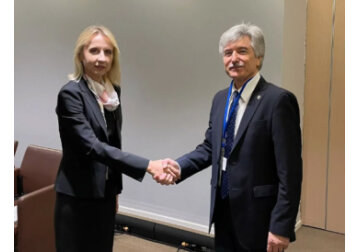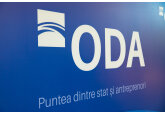
The EIB will invest 280 million euros in key sectors of the Moldovan economy in 2022, and will provide loans in combination with grants and technical assistance in the amount of 150 million to 170 million euros in 2023
Teresa Czerwińska, Vice President of the European Investment Bank, announced this during her participation in the third ministerial conference of the Moldova Support Platform in Paris. According to the EIB materials, the European Investment Bank (EIB), the bank of the European Union, continues to provide financial and technical support to Moldova, investing almost 280 million euros in loans and attracting about 16 million euros in grants for the public and private sectors in 2022. EIB Vice President Teresa Czerwińska announced new EIB investments for 2023 in key sectors of the Moldovan economy at the third ministerial conference of the Moldova Support Platform, highlighting investments in transport, energy and healthcare projects across the country. These investments are expected to help Moldova mitigate the economic and social impact of the Russian invasion of Ukraine and support Moldova's accession to the European Union. EIB Vice President Teresa Czerwińska, who is in charge of the bank's operations in Moldova, said the EIB will continue to contribute to building an economically strong, energy independent and green Moldova. “So far, we have done this by investing 280 million euros and mobilizing another 16 million euros in grants for projects in the public and private sectors in 2022 alone. Next year, our priority will be investments in the energy and transport sectors, which will help Moldova achieve energy independence and further integration with the European Union. We also plan to support projects in the health sector aimed at ensuring access to quality medical services. Our investments can bring tangible improvements to the lives of people in Moldova, making the EIB a reliable partner for the country. On the Moldova Support Platform in Paris, we informed our partners about these plans and sent a very clear signal that Moldova can continue to count on the EIB," she said. European Union Ambassador to Moldova Jānis Mažeiks said that the European Union is pleased to join forces with the EIB to help Moldova during the current energy crisis. "To date, the EU has committed €64 million in grant funds to joint EU-EIB initiatives. For the future, the EU has already announced 250 million euros, of which 50 million euros are intended to meet the country's budgetary needs to overcome this winter period. In addition, the European Union is committed to supporting Moldova in connecting its transport infrastructure to TEN-T. In the near future, the EU will provide a grant of 20 million euros for the rehabilitation of railways, will facilitate Moldova's participation in the Transport Community Treaty and will help the country develop a national mobility strategy. Thus, we remain committed to an effective and ongoing dialogue in this direction," he said. In line with the priorities of the EU and Moldova, the EIB reaffirmed its readiness to continue its involvement in the life of the country, in particular to help Moldova overcome serious problems, which it currently faces in the energy sector and the economy as a whole. As noted, the EIB expects to provide loans combined with grants and technical assistance in 2023 in the amount of approximately EUR 150 million to EUR 170 million. The funding is expected to cover a wide range of projects aimed at improving energy efficiency and climate change mitigation in line with the European Green Deal initiative in the region, meeting the country's needs in the health and digitalization sectors, and investing in Moldova's agri-food sector. The Team Europe invests in energy, transport and health infrastructure. Russia's war against neighboring Ukraine has created difficult economic and social problems for Moldova. These include soaring energy prices, high inflation, disrupted supply chains, lost trade opportunities and a humanitarian emergency caused by a large influx of refugees from Ukraine. The Moldovan government and the EIB have been working together throughout 2022 to mitigate these negative effects on the national economy. Thus, the EIB provided a loan of 150 million euros for the reconstruction of major highways, which will accelerate the integration of Moldova into the trans-European transport network and the European Union. By the end of 2022, EIB plans to provide Moldova with an additional 100 million euros to restore and upgrade other key national roads. The EIB has announced forthcoming investments in energy efficiency, energy security and diversification of energy supplies in Moldova, which are the key to energy independence from fossil fuels. He also announced plans to provide about 30 million euros to a private operator of the electricity distribution system in Moldova to finance the modernization, digitalization and expansion of the electricity distribution network, covering the central and southern part of the country, including the capital. In addition, a €12.4 million EU investment grant signed in 2022 will help the country implement an EIB project to improve the energy efficiency of public buildings, including hospitals, schools, kindergartens and other public institutions in Moldova. Together with the European Commission, the EIB has launched a pre-feasibility study to assess how best to connect the Ukrainian and Moldovan rail networks to the European Union. This is a strategic investment in sustainable green economic growth and improved global food security. This year, the EIB also worked with the Government of Moldova on a project to support the modernization and expansion of the public health sector, making it more resilient to major crises such as the COVID-19 pandemic and the war in Ukraine. Earlier this year, the EIB-managed Eastern Partnership Technical Assistance Trust Fund (EPTATF) and Swedfund jointly provided grants of €1.5 million to prepare a project to build two hospitals in Moldova, which is being carried out by the EIB and the Council of Europe Development Bank. Currently is being considered co-financing in 2023. The EIB has been operating in Moldova since 2007. To date, it has invested more than €1 billion in 26 projects across the country that support EU policy priorities, including projects in the areas of transport, energy, small and medium enterprises, agriculture, municipal infrastructure (solid waste, water supply and sewerage) and the service sector of the Moldovan economy. //22.11.2022 — InfoMarket.







